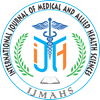Physiotherapy Outcomes on Sexual Dysfunction among Ischemic and Hemorrhagic Stroke Survivors
Pages : 24-28, doi: https://doi.org/10.54618/IJMAHS.2021115Download PDF
Abstract
Background & Purpose: Stroke is a major cause of disability and premature death in various developing countries, including India. Although various physical and psychological dysfunctions are associated with stroke, sexual dysfunction that is not often addressed either by the patient or by the health care provider can greatly influence the quality of living among stroke survivors.
Aim: The study is aimed at comparing the physiotherapy outcomes of sexual rehabilitation on sexual dysfunction among ischemic and hemorrhagic post-stroke survivors.
Materials & Methods: A total of 109 stroke patients, Ischemic (n=76) and Hemorrhagic (n=29) were selected for this research. A written consent was taken after inclusion criteria is satisfied. Both groups were given structured physiotherapy daily for a one-hour session along with psychological support by verbal communication. The sexual functioning is calculated by CSFQ-14 before intervention and after six months of follow-up.
Results: After sexual rehabilitation, both groups showed statistically significant improvement in sexual functioning (CSFQ-14 scores), p<0.001. But there was no significant difference between ischemic and hemorrhagic post-stroke survivors in sexual functioning statistically.
Conclusion: Both ischemic and hemorrhagic post-stroke survivors showed similar results on sexual functioning after physiotherapy. Hence, both ischemic and hemorrhagic post-stroke survivors can be included in a sexual rehabilitation program.
Keywords: Physiotherapy, Sexual rehabilitation, Stroke, Pelvic floor training, Sexual dysfunction





